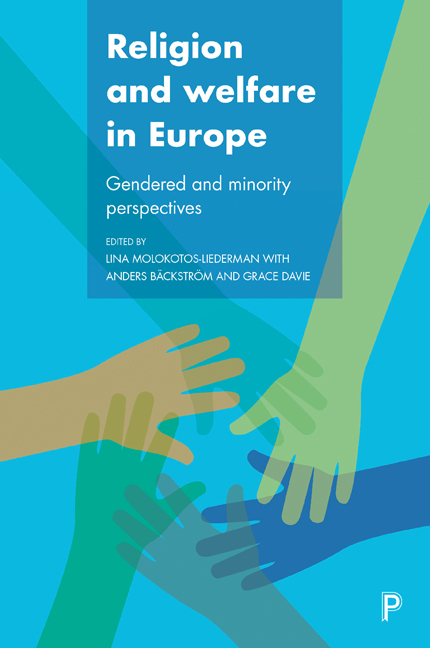Book contents
- Frontmatter
- Contents
- List of tables, figures and maps
- Acknowledgements
- Notes on contributors
- one Introduction
- Part One Thinking methodologically: approaches to research and practice
- Part Two Thinking regionally: key case studies in welfare and religion in Europe
- Part Three Gendered and minority perspectives
- Part Four Drawing the threads together
- Appendix: the WaVE team
- Index
Three - Using case studies in religion, values and welfare research
Published online by Cambridge University Press: 05 April 2022
- Frontmatter
- Contents
- List of tables, figures and maps
- Acknowledgements
- Notes on contributors
- one Introduction
- Part One Thinking methodologically: approaches to research and practice
- Part Two Thinking regionally: key case studies in welfare and religion in Europe
- Part Three Gendered and minority perspectives
- Part Four Drawing the threads together
- Appendix: the WaVE team
- Index
Summary
Introduction
This chapter both continues and deepens the conversation initiated in Chapter Two. Its purpose is to address a series of methodological and ethical issues that emerge from the study of religion, values and welfare using a case study approach. A selection of methodological choices will be considered, drawing particularly on data from the Norwegian case studies in the Welfare and Values in Europe: Transitions Related to Religion, Minorities and Gender (WaVE) project and its predecessor, the Welfare and Religion in a European Perspective: A Comparative Study of the Role of the Churches as Agents of Welfare within the Social Economy (WREP) project. Particular attention is paid to the challenges and implications of this type of research for policy debates and for a variety of end users (such as politicians and religious leaders). The chapter will discuss how public policy debates may affect the reliability and validity of such studies.
Methods and data
The chapter draws on the objectives, methods, data and experiences from the two European research projects mentioned earlier: WREP and WaVE. The basic aim of WREP was to analyse the function of majority churches as agents of social welfare. WaVE continued the work of WREP by setting out to study the impact of ‘religion […] as a bearer of solidarity and social cohesion, or as a source of tension and exclusion’ (Bäckström, 2011, p 4) and minority values, as expressed in the search for, and use of, welfare services, paying particular attention to the extent to which views and practices challenge majority values and identities. Both projects were constructed with a comparative perspective in mind. In this chapter we use the distinction made by Ragin and Amoroso (2011) between what we may call qualitative and comparative research strategies, but restrict ourselves to the former, considering each case study as a way of ‘using qualitative methods to study commonalities’ (Ragin and Amoroso, 2011, chapter 5).
In both projects, the data collection was based on a qualitative research strategy, primarily qualitative interviews (Yeung, 2006; Bäckström, 2011). Both WREP and WaVE sought to address a significant weakness in research on welfare, values and religion (Bäckström, 2003; Fokas, 2005).
- Type
- Chapter
- Information
- Religion and Welfare in EuropeGendered and Minority Perspectives, pp. 37 - 52Publisher: Bristol University PressPrint publication year: 2017



